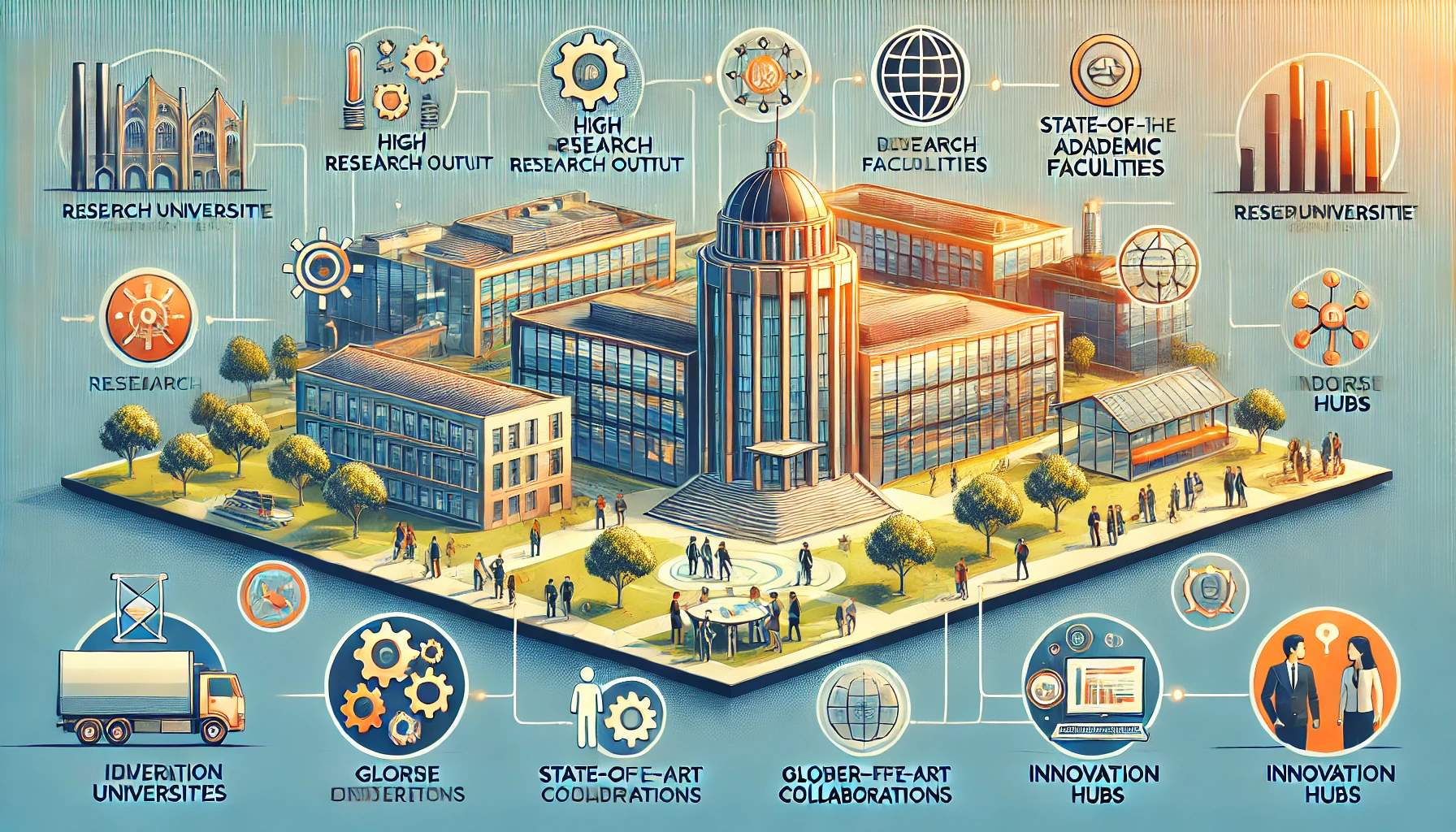In the world of higher education, Research University stand as the pinnacle of intellectual pursuit and academic excellence. These institutions are not only centers of learning but also dynamic hubs of innovation, discovery, and societal impact. While many universities focus primarily on teaching and undergraduate education, research universities are dedicated to pushing the boundaries of knowledge, conducting groundbreaking research, and addressing some of the world’s most pressing challenges. Their influence extends far beyond the campus, shaping industries, governments, and communities through the transformative power of research.
What Defines a Research University?
At its core, a research university is an institution that prioritizes the creation of new knowledge through rigorous research programs. These universities are characterized by their commitment to scholarly inquiry across various disciplines, from the humanities and social sciences to engineering, medicine, and the natural sciences. Research universities are typically equipped with state-of-the-art facilities, offer graduate-level programs (master’s and doctoral degrees), and support research projects that lead to academic publications, technological advancements, and societal innovations.
Research universities are distinguished by their active involvement in producing high-quality research, often funded by government agencies, private corporations, and non-profit organizations. Faculty members are not only educators but also researchers who contribute to their fields through published works, patents, and collaborative projects. Students, especially at the graduate level, are given the opportunity to engage in research alongside faculty, contributing to the knowledge production process.
The Key Characteristics of Research Universities

- Commitment to Scholarly Research
The defining feature of a research university is its emphasis on research. Unlike traditional colleges, where teaching may be the primary focus, research universities aim to produce original, peer-reviewed knowledge that advances understanding in specific fields. Faculty members at research universities are expected to balance their roles as educators with their responsibilities as researchers, often spending a significant portion of their time conducting experiments, gathering data, and publishing their findings.
- Graduate and Doctoral Programs
Research universities are home to advanced graduate programs, offering master’s and doctoral degrees in a wide range of disciplines. These programs are designed not just to provide further academic education but also to prepare students for careers in research, academia, industry, and public policy. Doctoral students, in particular, engage in deep, specialized research, working closely with faculty members to contribute to the body of knowledge in their fields.
- Cutting-Edge Facilities and Resources
To support their research efforts, research universities invest heavily in state-of-the-art laboratories, research centers, and libraries. These facilities provide the resources necessary for conducting groundbreaking studies and experiments. Whether it’s a bioengineering lab, a computer science innovation hub, or a medical research facility, these spaces foster collaboration and innovation, allowing researchers to explore new ideas and solve complex problems.
- Collaboration and Interdisciplinary Research
Research universities often encourage interdisciplinary research, where scholars from different fields come together to tackle complex problems that cannot be solved within a single discipline. This collaborative environment is key to addressing global challenges such as climate change, public health crises, technological innovation, and social inequality. For instance, solving issues related to climate change might involve collaboration between environmental scientists, economists, policy experts, and engineers. This interdisciplinary approach often leads to groundbreaking discoveries and novel solutions.
- Global Influence and Impact
Research universities are not isolated from the world—they have a profound global impact. Their research outputs influence industries, governments, and policy decisions around the world. For example, advancements in medical research conducted at research universities often lead to new treatments and therapies that save lives. Technological innovations developed in university labs can transform entire industries, from information technology to renewable energy. Furthermore, many research universities collaborate with international organizations, contributing to global initiatives and solving problems that require collective action.
The Role of Research Universities in Innovation and Economic Growth

One of the most significant contributions of research universities is their role in driving innovation and fostering economic growth. Research universities are incubators of new ideas, where researchers push the boundaries of knowledge and develop technologies that have practical applications in the real world.
1. Technological Innovation
Many of the world’s most revolutionary technologies have been developed in research universities. The internet, GPS, and modern medical imaging technologies all have roots in university research. By providing resources, expertise, and a collaborative environment, research universities enable the creation of new technologies that drive economic progress. Furthermore, universities often partner with private industry to commercialize their research, resulting in the development of new products, services, and industries.
2. Economic Impact and Job Creation
Research universities also have a direct economic impact on their local and national economies. Through research projects, university-based spin-off companies, and collaborations with industry partners, these institutions generate jobs and contribute to economic development. For example, universities may develop new biotech companies or tech startups that create thousands of jobs. Additionally, the presence of a leading research university can attract investment, skilled professionals, and other businesses to the region, further driving economic growth.
3. Public Policy and Social Change
Research universities are often at the forefront of shaping public policy and social change. Through their research and the dissemination of knowledge, they inform government decisions and advocate for policies that improve society. Researchers in fields like economics, sociology, and public health provide insights that influence legislation, healthcare reform, education policy, and environmental protections. By using evidence-based research, these institutions ensure that policies are grounded in solid data and rigorous analysis, ultimately benefiting the public good.
The Benefits of Being Part of a Research University

For students, being part of a research university offers a range of unique benefits that go far beyond traditional classroom learning. At research universities, students have access to a wealth of resources and opportunities for hands-on learning, collaboration, and mentorship from leading experts in their fields.
- Access to Cutting-Edge Knowledge
Students at research universities are often among the first to learn about new developments in their field. Whether through attending lectures by guest speakers, participating in research seminars, or accessing the latest publications, students are exposed to the most current and relevant knowledge available.
- Engagement in Hands-On Research
Students, particularly at the graduate level, are encouraged to engage in research projects that allow them to apply theoretical knowledge to real-world problems. This hands-on experience is invaluable, providing students with the skills needed to conduct independent research and contribute to the advancement of their discipline. For doctoral students, research involvement is often the foundation of their academic and professional careers.
- Collaboration with Leading Experts
At research universities, students have the opportunity to collaborate with world-renowned faculty members and researchers. This exposure to experts in the field provides invaluable mentorship and guidance, helping students refine their research skills and expand their intellectual horizons. In many cases, students have the chance to work on groundbreaking research projects alongside their professors, contributing to significant scientific, technological, or social discoveries.
- Interdisciplinary Learning
Research universities promote interdisciplinary collaboration, allowing students to work across disciplines and gain a holistic understanding of complex issues. For example, a student studying climate change might collaborate with peers in the fields of economics, policy studies, and environmental science, resulting in a more comprehensive and impactful approach to the problem. This interdisciplinary learning prepares students for the complex challenges they will face in the workforce and in society.
Conclusion: The Lasting Legacy of Research Universities
Research universities are at the heart of human progress, shaping the future through innovation, discovery, and the pursuit of knowledge. Their commitment to advancing academic research, fostering collaboration, and addressing global challenges ensures their continued relevance in today’s rapidly evolving world. For students, faculty, and society at large, research universities provide a platform for creativity, intellectual exploration, and societal transformation. As we look to the future, the role of research universities in solving the world’s most pressing problems and advancing the human condition will only continue to grow, making them indispensable pillars of our global knowledge ecosystem.

